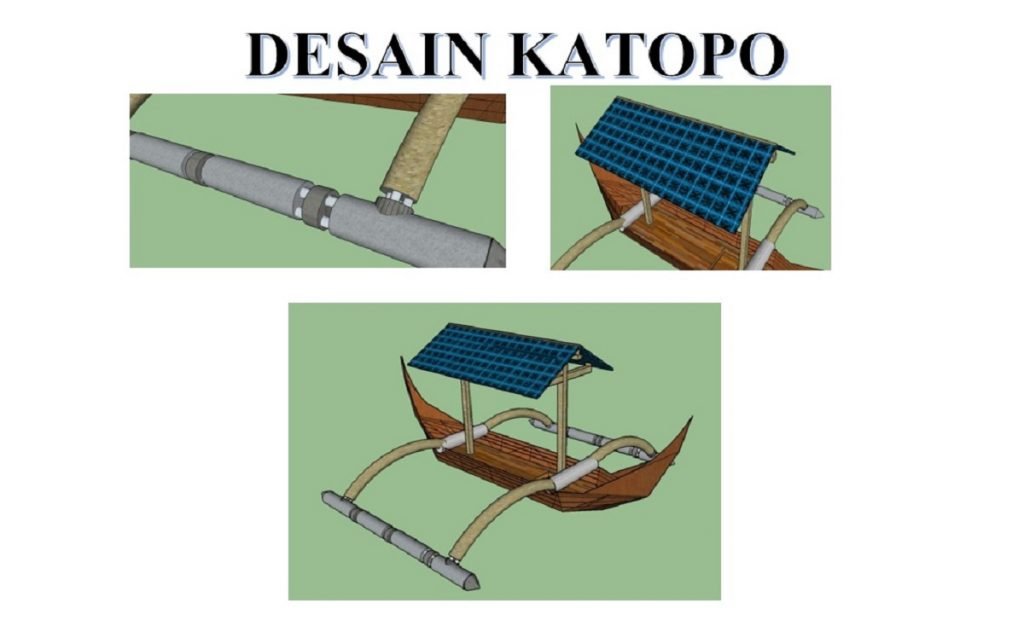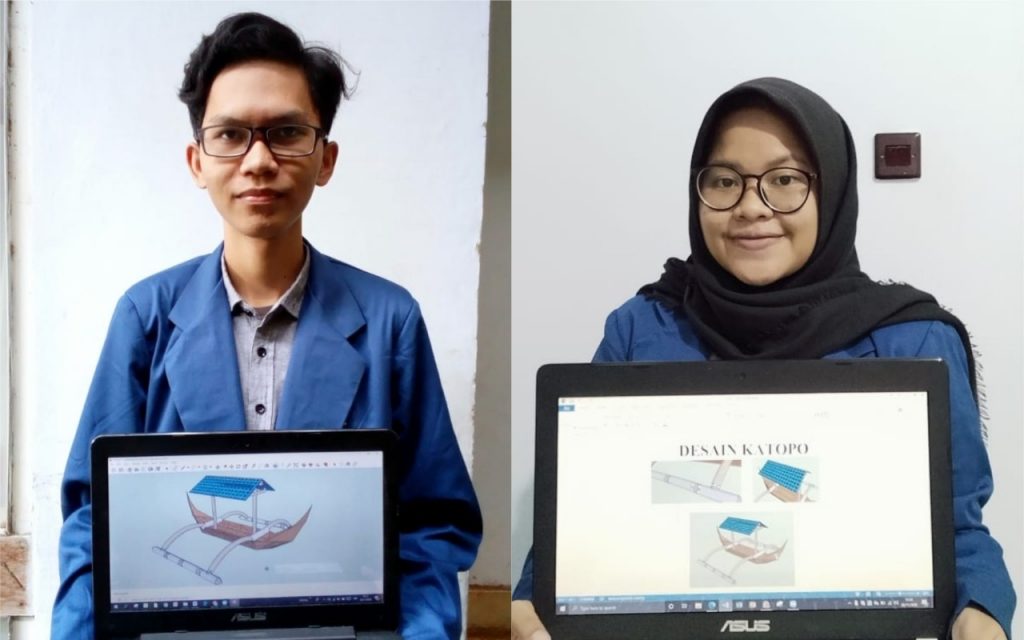ITS Students Create Katopo, Environmentally Friendly Support Ship

An overview of the Katopo prototype, Eco-friendly Support Boat Innovation, an idea of the ITS student team
ITS Campus, ITS News –The period of the Covid-19 pandemic is not an obstacle for students of the Institut Teknologi Sepuluh Nopember (ITS) to continue to innovate. Two students of the ITS Civil Infrastructure Engineering Department succeeded in initiating an environmentally friendly support ship by utilizing the energy of the sea waves.
The two students are Ayunda Iga Indraswari and Muhammad Arif Billah. They succeeded in making an innovative wave power ship named Katopo. “This name has an acronym, namely ship with PLTO-Naga Air and Photovoltaic Cells energy sources,” said Ayunda.
Ayunda explained that the innovation utilizes sea waves’ energy as energy to propel ships whose systems are integrated into the outrigger. This Waves Power Plant (PLTO) uses a moored floating system and consists of several interconnected structures in the form of a floating cylinder (pontoon) with a flexible connector (hydraulic rod).
By seeing the increase in the development of marine fish catches in Banyuwangi, of course, this is inseparable from the role of local fishers who sail to fish. “Especially in Muncar Subdistrict itself, 9,846 active fishermen have been recorded,” said Ayunda, a student from Banyuwangi.
Based on a report from the Department of Maritime Affairs and Fisheries, Banyuwangi Regency, it is revealed that most of the fishing boats in Muncar still use fuel-fueled motorcycles. Then fishers also work around this by modifying the boat engine to use a mixture of fuel with a specific ratio.

(from left) Muhammad Arif Billah and Ayunda Iga Indraswari showing the Katopo prototype
The behavior of fishers who often dispose of leftover fuel also can cause pollution, thus reducing the quality of the waters in the port. Departing from these problems, Ayunda and Arif thought to minimize the impact of environmental pollution caused by dumping oil into the sea. “Namely by replacing ships fueled with fuel with ships with sea wave energy, because they do not have a bad impact on the environment,” said Ayunda.
Katopo, which utilizes sea waves’ energy as ship propulsion, has a height and an irregular wave period. So they combine it with solar energy. The energy from the waves is converted into electrical energy and stored in the battery or battery. Then, the solar cells on the roof of the ship will also generate additional energy in the engine to be used as a motor for fishing boats.
Thanks to innovations that are considered beneficial for this environment, these two students have succeeded in getting recognition as champions in the essay competition held by UPN Veteran East Java some time ago. They wrote an essay entitled Katopo: Innovation of Environmentally Friendly Jukung Boats in Muncar Banyuwangi Waters with Energy Sources for PLTO-Naga Air and Photovoltaic Cells on Outriggers and Ship Roofs to Realize SDGs 2030.
Through this innovation that is considered environmentally friendly and does not cost a lot of money, Ayunda hopes that Katopo can improve Indonesia’s waters. “Besides, it can increase the quality of life of fishermen and foster the welfare of fishermen in Indonesia, especially Banyuwangi,” she concluded hopefully. (naj/ris/ITS Public Relations)
Related News
-
Anticipating Lost Pet Dogs, ITS Students Invent a Tracking Bag
ITS Campus, ITS News —Losing a pet is a sad thing for its owners. To anticipate this, a team
December 21, 2020 16:12 -
ITS Students Integrate Smart City Service Features Through Visionaries
ITS Campus, ITS News — Institut Teknologi Sepuluh Nopember (ITS) continues to prove itself as a home for talented
December 21, 2020 16:12 -
ITS Students Innovate Eco-Quake Building Concept
ITS Campus, ITS News — Along with the development of technology, the construction sector has also experienced rapid growth
December 21, 2020 16:12 -
Great, ITS Successfully Becomes Overall Champion of the 2024 Indonesian Ship Contest
ITS Campus, ITS News — Proving itself as a home for champions, Institut Teknologi Sepuluh Nopember (ITS) managed to
December 21, 2020 16:12
